

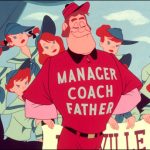

Baseball continued to be a popular subject in film during the 1950’s. Among live-action features of the decade were “Kill the Umpire” with William Bendix, “Rhubarb” (about a cat inheriting a baseball team), “Angels in the Outfield”, the dramatic “Bang the Drum Slowly”, and the film adaptation of the Broadway musical, “Damn Yankees”, about a soul-selling pact with the devil being the only way to keep the Yankees from once again winning the pennant. (The latter film, produced by Warner Brothers, would figure into animation in the 1960’s, in Friz Freling’s self-authored script for Tweety and Sylvester’s “Rebel Without Claws”, a civil war spoof that, while having nothing plotwise to do with baseball, intentionally drops in the line “Damn Yankees!”, and even Tweety proclaiming, “I tawt I taw a damn Yankee cat!”) Likewise, animation continued with its periodic references to the sport. This week, Disney and Warner Brothers contribute dedicated episodes on the subject, while shorter gag sequences appear from Warner, Terrytoons, and Famous, the latter particularly capturing the bleacher atmosphere that many of its New York animators probably experienced on a weekly basis in their following of the exploits of the city’s big-name teams.
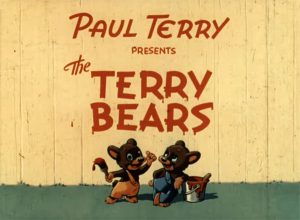 Pet Problems (Terrytoons/Fox, Terry Bears, 4/1/54 – Eddie Donnelly, dir.) – The beara’ St. Bernard Pego is at it again, causing mischief and destruction. Papa insists that Pego be tied up so he won’t interfere with Papa’s slumber. But not so easy with a dog this size, as Pego breaks off the trunk of a tree he is tied to, following the kids right into the house and up the stairs, widening the front door and stairwell by the length of the wood he drags behind. The little bears decide to tie him to something more solid, choosing the water pipe and hose attachment located on the side of the house. The kids then begin to engage in a game of backyard baseball. One hits a pop fly, which Pego manages to catch in his mouth. Eager to return the ball to the boys, Pego races forwards – taking the entire plumbing system of the house along with him, dragged right through the house’s side wall. At the end of the plumbing line is Papa, engaged in a bath in the family bathtub. As he hollers for help, a foot of the tub catches on a rock, causing the tub to make an abrupt halt, with only a portion of the drain pipe remaining attached as Pego breaks off the rest of the piping in his haste. The sudden stop is like braking a car with no seat belt, and Papa finds himself jammed inside the remaining drainpipe, in a confining metal bulge. All the boys can see of Papa is his eye peering through the hole at their end of the pipe. “Uh oh”, responds one boy, while the other reassures Papa that they’ll find some way to get him out. The next thing we know, the boys are loading sticks of dynamite into the tub end of the pipe behind Papa, and lighting the fuse. Papa is blown out the drain end, with such force as to cut a silhouette of himself into a stream of water from a garden sprinkler, and to leave similar holes in the side of the house, Papa being heard to penetrate four additional layers of wall within.
Pet Problems (Terrytoons/Fox, Terry Bears, 4/1/54 – Eddie Donnelly, dir.) – The beara’ St. Bernard Pego is at it again, causing mischief and destruction. Papa insists that Pego be tied up so he won’t interfere with Papa’s slumber. But not so easy with a dog this size, as Pego breaks off the trunk of a tree he is tied to, following the kids right into the house and up the stairs, widening the front door and stairwell by the length of the wood he drags behind. The little bears decide to tie him to something more solid, choosing the water pipe and hose attachment located on the side of the house. The kids then begin to engage in a game of backyard baseball. One hits a pop fly, which Pego manages to catch in his mouth. Eager to return the ball to the boys, Pego races forwards – taking the entire plumbing system of the house along with him, dragged right through the house’s side wall. At the end of the plumbing line is Papa, engaged in a bath in the family bathtub. As he hollers for help, a foot of the tub catches on a rock, causing the tub to make an abrupt halt, with only a portion of the drain pipe remaining attached as Pego breaks off the rest of the piping in his haste. The sudden stop is like braking a car with no seat belt, and Papa finds himself jammed inside the remaining drainpipe, in a confining metal bulge. All the boys can see of Papa is his eye peering through the hole at their end of the pipe. “Uh oh”, responds one boy, while the other reassures Papa that they’ll find some way to get him out. The next thing we know, the boys are loading sticks of dynamite into the tub end of the pipe behind Papa, and lighting the fuse. Papa is blown out the drain end, with such force as to cut a silhouette of himself into a stream of water from a garden sprinkler, and to leave similar holes in the side of the house, Papa being heard to penetrate four additional layers of wall within.
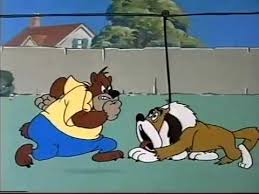 Finding his pants, a somewhat battered but fiercely angry Papa emerges from the house, armed with shotgun, and committed to murder Pego. However, someone seems to be ahead of him. Before his eyes solemnly march the boys, leading Pego by rope, blindfolded. One of the boys carries a ship’s anchor. Together, they proceed to a cliff overlooking a nearby river. One boy fastens the anchor to the rope around Pego’s neck, and lifts it as if to toss it over the cliffside, sadly informing Pego that he has really done it in angering Papa, and now he has to go. Papa is emotionally moved by this saddening sight, and nearly breaks into tears. “Stop!”, he shouts, and reaches to untie the rope around Pego’s neck. “I forgive you. You’re free”, declares Papa. One of the boys winks to the other, indicating that the whole thing was a trick to fool Papa. Pego enthusiastically begins to slurp Papa’s face, but his bounding bounces knock the anchor over the side of the cliff. The detached rope snags around Papa’s ankle, and Papa finds himself taking the weighted dive meant for Pego. The dog and kids don’t need any further cue to beat a hasty retreat over the hills, and Papa, finally detached from the rope, slowly rises from the river water, then bats at is as if trying to beat the water into submission, yelling at the top of his lungs, “You can’t win! YOU CAN’T WIN!”
Finding his pants, a somewhat battered but fiercely angry Papa emerges from the house, armed with shotgun, and committed to murder Pego. However, someone seems to be ahead of him. Before his eyes solemnly march the boys, leading Pego by rope, blindfolded. One of the boys carries a ship’s anchor. Together, they proceed to a cliff overlooking a nearby river. One boy fastens the anchor to the rope around Pego’s neck, and lifts it as if to toss it over the cliffside, sadly informing Pego that he has really done it in angering Papa, and now he has to go. Papa is emotionally moved by this saddening sight, and nearly breaks into tears. “Stop!”, he shouts, and reaches to untie the rope around Pego’s neck. “I forgive you. You’re free”, declares Papa. One of the boys winks to the other, indicating that the whole thing was a trick to fool Papa. Pego enthusiastically begins to slurp Papa’s face, but his bounding bounces knock the anchor over the side of the cliff. The detached rope snags around Papa’s ankle, and Papa finds himself taking the weighted dive meant for Pego. The dog and kids don’t need any further cue to beat a hasty retreat over the hills, and Papa, finally detached from the rope, slowly rises from the river water, then bats at is as if trying to beat the water into submission, yelling at the top of his lungs, “You can’t win! YOU CAN’T WIN!”
A heavily edited version, cropped of about one minute merely for time as opposed to censorship, and yet still holding up well in preserving storyline, is included below.
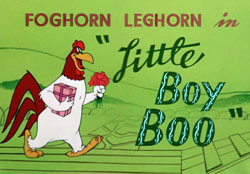 Little Boy Boo (Warner, Foghorn Leghorn, 6/5/54 – Robert McKimson, dir.) – “Coldest Winter on Way Here”, reads a newspaper headline. A breeze blows through the unshuttered windows of Foghorn Leghorn’s chicken coop, which has obviously seen better days, and which the rooster has let run down. “Feels like it’s already here”, observes the trembling Foggy. One more winter in this “air-conditioned deep freeze”, and Foggy is sure he’ll freeze his tail feathers off. A look out the window at the barnyard community reveals a potential alternative for lodging – a cozy coop owned by a widow hen. Foggy decides he’s been a bachelor too long.
Little Boy Boo (Warner, Foghorn Leghorn, 6/5/54 – Robert McKimson, dir.) – “Coldest Winter on Way Here”, reads a newspaper headline. A breeze blows through the unshuttered windows of Foghorn Leghorn’s chicken coop, which has obviously seen better days, and which the rooster has let run down. “Feels like it’s already here”, observes the trembling Foggy. One more winter in this “air-conditioned deep freeze”, and Foggy is sure he’ll freeze his tail feathers off. A look out the window at the barnyard community reveals a potential alternative for lodging – a cozy coop owned by a widow hen. Foggy decides he’s been a bachelor too long.
Two things (among others) are unusual about this short. The widow turns out to be the (former) Miss Prissy. Gads! Someone (besides Foggy) actually married her? Who was the “lucky” stiff, and did Prissy’s style of romance cause his demise? Or did he just volunteer to become someone’s Sunday dinner to get away from it all? Secondly, Prissy never once utters the word “Yesss” in this cartoon, instead handling a full script of fairly rapid dialogue, provided by Bea Bernaderet. Where went her speech impediment? Still, she is the same old Prissy – homely and scrawny as ever. Foggy appears at her door (after exiting his own coop, the front door falling off its hinges). Yes, Foggy has at least made the expense to purchase her a box of candy – but as for flowers? He simply plucks up a bouquet by the roots, right out of the window box at Prissy’s own window. Upon being invited in by the eager widow, the candy and flowers are abruptly exchanged, and Foggy announces that the courtship is over, immediately (and rather gruffly) proposing. Prissy oddly hesitates. Foggy turns on the sweetness, claiming (with a hidden grain of truth) that “I need your love to keep me warm.” Prissy finally reveals the reason for her hesitation. She wants to make sure that Foggy would make a good father for her son. (Another shock! Prissy with a child? I guess old “square-britches” was finally able to lay eggs after all, even after all her trouble with Porky Pig in “An Egg Scramble”.) Cut to the bespectacled Egghead Jr., engrossed in leisure-reading of a volume titled “Splitting the Fourth Dimension”. (So was Prissy’s husband Egghead Sr.? If so, how did he ever wind up married to her, when all his brains should have told him otherwise? Proof that opposites attract, and love is blind.) Prissy suggests Foghorn take Junior out to play, as a test to see if Junior would like Foggy as a father.
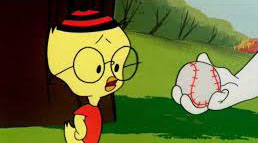 Foggy’s first suggestion is a game is baseball. Despite his super-genius I.Q., Egghead apparently doesn’t keep up much with the outside world or the activities of other children – or even adults. His unfamiliarity with the concept of the game is quickly evidenced by his reaction at first seeing a ball. Having no idea what it is for, Egghead immediately attempts to eat it! Foghorn snatches the ball from his beak, and inquires, ‘Haven’t you ever seen a baseball before? Haven’t you ever played baseball? All he can get from the kid are shakes of his head, no. To the audience, Foghorn asides in dismay, “There’s something kinda y-e-e-e-e-sh about a kid that’s never played baseball!’ Foggy shows Egghead a bat, and at least Egghead has a more intuitive idea of what to use it for – to smash Foghorn over the head with. Not me, yells a frustrated Foghorn, “the BALL!” Foghorn steps back to pitch a few to Junior. He challenges Junior to sock one right down his throat. On the first pitch, Junior does hist that – and right into Foghorn’s gullet. Foghorn thinks it safer to change places with Junior, and himself steps up to bat. He tells Junior to put a little pepper on it. Junior takes him literally, stepping away for a moment to retrieve a pepper shaker, and liberally sprinkling the stuff on the ball. But then Egghead begins to address the situation in his own way. Pulling out a pencil and piece of paper, he begins scribbling a diagram of a baseball diamond (how did he know how it is shaped?) and an elaborate set of mathematical calculations, the final equation having a result equaling, “STRIKE”. (Is Egghead holding back on revealing his true knowledge of the game to Foggy, considering that Foghorn hasn’t even informed him of the term “strike” yet?) Satisfied, Egghead delivers a pitch. The ball approaches so fast, Foghorn can’t even see it, and is still asking for the pitch when the ball passes him by. Suddenly, Foghorn becomes aware of his bat – pierced by the pitch with a gaping ball-sized hole through the wood. Turning his head, Foghorn observes an even more shocking development. Identical ball holes now appear in the trunks of a half-dozen trees in a row standing behind him. Foghorn mutters that there’s something about this whole thing that “just don’t add up”. A tap at his leg reveals Egghead, who hands him the sheet of calculations. Foggy has to admit that “I guess it does add up”, though gazing at the paper in such confusion, he can’t tell if he is holding the paper upside down or sideways, turning it in various directions as he ponders it in puzzlement.
Foggy’s first suggestion is a game is baseball. Despite his super-genius I.Q., Egghead apparently doesn’t keep up much with the outside world or the activities of other children – or even adults. His unfamiliarity with the concept of the game is quickly evidenced by his reaction at first seeing a ball. Having no idea what it is for, Egghead immediately attempts to eat it! Foghorn snatches the ball from his beak, and inquires, ‘Haven’t you ever seen a baseball before? Haven’t you ever played baseball? All he can get from the kid are shakes of his head, no. To the audience, Foghorn asides in dismay, “There’s something kinda y-e-e-e-e-sh about a kid that’s never played baseball!’ Foggy shows Egghead a bat, and at least Egghead has a more intuitive idea of what to use it for – to smash Foghorn over the head with. Not me, yells a frustrated Foghorn, “the BALL!” Foghorn steps back to pitch a few to Junior. He challenges Junior to sock one right down his throat. On the first pitch, Junior does hist that – and right into Foghorn’s gullet. Foghorn thinks it safer to change places with Junior, and himself steps up to bat. He tells Junior to put a little pepper on it. Junior takes him literally, stepping away for a moment to retrieve a pepper shaker, and liberally sprinkling the stuff on the ball. But then Egghead begins to address the situation in his own way. Pulling out a pencil and piece of paper, he begins scribbling a diagram of a baseball diamond (how did he know how it is shaped?) and an elaborate set of mathematical calculations, the final equation having a result equaling, “STRIKE”. (Is Egghead holding back on revealing his true knowledge of the game to Foggy, considering that Foghorn hasn’t even informed him of the term “strike” yet?) Satisfied, Egghead delivers a pitch. The ball approaches so fast, Foghorn can’t even see it, and is still asking for the pitch when the ball passes him by. Suddenly, Foghorn becomes aware of his bat – pierced by the pitch with a gaping ball-sized hole through the wood. Turning his head, Foghorn observes an even more shocking development. Identical ball holes now appear in the trunks of a half-dozen trees in a row standing behind him. Foghorn mutters that there’s something about this whole thing that “just don’t add up”. A tap at his leg reveals Egghead, who hands him the sheet of calculations. Foggy has to admit that “I guess it does add up”, though gazing at the paper in such confusion, he can’t tell if he is holding the paper upside down or sideways, turning it in various directions as he ponders it in puzzlement.
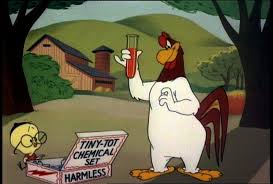 Foghorn spends the remainder of the film in the same sort of bafflement while trying to engage Egghead in other forms of play. Making paper airplanes results in a revolutionary new design by Junior, that folds into an approximate equivalent of a jet fighter with twin machine guns, shooting Foghorn’s traditional triangulated fold down in flames. “Oh, bever mind, Einstein”, says Foghorn when Junior attempts to hand him a calculation sheet again. “Knowin’ the answer wouldn’t do me no good anyway.” A game of hide and seek finds Foggy hiding under the lid of a barn feed box, and chuckling that the boy would have to use a slide rule to find him in here. Several yards away, Egghead is already doing so – then heads in the wrong direction, digs a hole in the ground with a shovel, and somehow comes up with Foghorn on the end of the shovel from the hole. “But boy – – the box!” Egghead again shows him the figures. ‘One side”, says Foggy, determined to prove Egghead wrong, and approaches the feed box where he knows he hid. But Foghorn hesitates to fully investigate, refusing to open the lid. “I just might be in there”, he mutters. Finally, Egghead turns to his own kind of game – playing with a Tiny Tot chemistry set, the box guaranteeing it to be harmless. Egghead mixes two vials of chemicals together, and Foghorn assumes he must be making a soda pop. Holding his thumb over the test tube containing the combined fluids, Foghorn shakes the solution, then remarks, “Watch it fizz.” Upon removal of his thumb pressure, a loud explosion envelops Foggy in a cloud, and when the smoke clears, Foghorn is sizzling and denuded of feathers. (The networks frequently cut the explosion, for no justifiable reason except perhaps to keep kids from dabbling in chemistry, and committed essential murder in the process to the story continuity.) The final shot has Foghorn returning Junior to Prissy, and announcing the deal’s off. Prissy reminds him that he said he needed her love to keep him warm. But the situation has changed for Foggy, now wrapped from head to toe in surgical dressing. “I’ve got my bandages to keep me warm!”
Foghorn spends the remainder of the film in the same sort of bafflement while trying to engage Egghead in other forms of play. Making paper airplanes results in a revolutionary new design by Junior, that folds into an approximate equivalent of a jet fighter with twin machine guns, shooting Foghorn’s traditional triangulated fold down in flames. “Oh, bever mind, Einstein”, says Foghorn when Junior attempts to hand him a calculation sheet again. “Knowin’ the answer wouldn’t do me no good anyway.” A game of hide and seek finds Foggy hiding under the lid of a barn feed box, and chuckling that the boy would have to use a slide rule to find him in here. Several yards away, Egghead is already doing so – then heads in the wrong direction, digs a hole in the ground with a shovel, and somehow comes up with Foghorn on the end of the shovel from the hole. “But boy – – the box!” Egghead again shows him the figures. ‘One side”, says Foggy, determined to prove Egghead wrong, and approaches the feed box where he knows he hid. But Foghorn hesitates to fully investigate, refusing to open the lid. “I just might be in there”, he mutters. Finally, Egghead turns to his own kind of game – playing with a Tiny Tot chemistry set, the box guaranteeing it to be harmless. Egghead mixes two vials of chemicals together, and Foghorn assumes he must be making a soda pop. Holding his thumb over the test tube containing the combined fluids, Foghorn shakes the solution, then remarks, “Watch it fizz.” Upon removal of his thumb pressure, a loud explosion envelops Foggy in a cloud, and when the smoke clears, Foghorn is sizzling and denuded of feathers. (The networks frequently cut the explosion, for no justifiable reason except perhaps to keep kids from dabbling in chemistry, and committed essential murder in the process to the story continuity.) The final shot has Foghorn returning Junior to Prissy, and announcing the deal’s off. Prissy reminds him that he said he needed her love to keep him warm. But the situation has changed for Foggy, now wrapped from head to toe in surgical dressing. “I’ve got my bandages to keep me warm!”
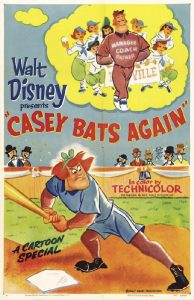 Casey Bats Again (Disney/RKO, 6/18/54 – Jack Kinney, dir.) – You just couldn’t keep Kinney away from directing sports cartoons, even when the theatrical run of his Goofy cartoons had come to a close. The preceding year, Kinney would hilariously revisit the subject of football in “Football Now and Then”. 1954 found him revisiting his old friend the Mighty Casey from “Make Mine Music” of almost a decade before – and picking up right where he left off. Casey still stands under a cloud at the empty Mudville stadium, weeping over his career-ending loss. But, a surprise is revealed that was never hinted at in the original film. Despite being a lady-killer in the original, Casey is already secretly married! (I guess he didn’t let on to the crowds in the original picture to keep attendance up at the stadium. But in a small town like Mudville, how did he ever manage to keep such a fact a secret?) Mrs. Casey doesn’t seem to hold a grudge about Casey’s previous flirtations, and in fact delivers exciting news to cheer up her downtrodden husband. A blessed event is on the way. Casey’s entire demeanor brightens, and he lovingly embraces his wife, anticipating the junior Casey who will result from their union, destined to carry the Casey name into the Baseball Hall of Fame. Even nature changes its tune, as the clouds above Casey depart, and rays of bright sunshine smile down upon the Caseys and the Mudville field.
Casey Bats Again (Disney/RKO, 6/18/54 – Jack Kinney, dir.) – You just couldn’t keep Kinney away from directing sports cartoons, even when the theatrical run of his Goofy cartoons had come to a close. The preceding year, Kinney would hilariously revisit the subject of football in “Football Now and Then”. 1954 found him revisiting his old friend the Mighty Casey from “Make Mine Music” of almost a decade before – and picking up right where he left off. Casey still stands under a cloud at the empty Mudville stadium, weeping over his career-ending loss. But, a surprise is revealed that was never hinted at in the original film. Despite being a lady-killer in the original, Casey is already secretly married! (I guess he didn’t let on to the crowds in the original picture to keep attendance up at the stadium. But in a small town like Mudville, how did he ever manage to keep such a fact a secret?) Mrs. Casey doesn’t seem to hold a grudge about Casey’s previous flirtations, and in fact delivers exciting news to cheer up her downtrodden husband. A blessed event is on the way. Casey’s entire demeanor brightens, and he lovingly embraces his wife, anticipating the junior Casey who will result from their union, destined to carry the Casey name into the Baseball Hall of Fame. Even nature changes its tune, as the clouds above Casey depart, and rays of bright sunshine smile down upon the Caseys and the Mudville field.
As the big day arrives, Casey demandingly phones for the doctor to come to his house for
the delivery – but can’t seem to complete the call. The doctor has been contacted so many times, he recognizes the ring – and is off to the Casey house without even picking up the receiver. While Casey continues to struggle with the operator to get his call though, the doctor slips into the house unnoticed by him, then slips him the bundle of joy. Casey is soon wheeling gis offspring outside in a carriage for the world to see, and is pleased and amazed when the kid tosses a rattle at him, with the precision of a skilled infielder. Casey substitutes baseball and glove for the rattle, and the kid handles a catch of the ball as if covering the base for a quick out at first. The child then tosses the ball back to Casey with the speed of a fast-ball pitcher, causing a brief flame to ignite from Casey’s hand. A baseball natural! There’s just one small detail Casey has overlooked, and Mrs. Casey can’t seem to get a word in edgewise to explain it to him. Only when Casey first assists in a change of diapers does he discover that his miracle child is not exactly what he thought – but a girl! Immediately upon this revelation, another dark cloud appears from nowhere in the sky above the Casey house, and rain pours down upon Casey’s world again.
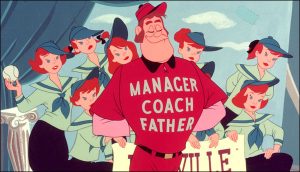 If at first you don’t succeed. Casey and the Mrs. get busy again (offscreen, of course), and soon another whisper, and another baby, are on the way. In fact, this time, triplets! But – – three girls. Above, three rain clouds appear to drown Casey’s sorrows. More time passes, and Casey’s batting average is depicted in the form of a scoreboard, between Boys vs. Girls. The tally for boys displays a no-hit shutout, while the girls’ chalk up a whopping score of nine. With a line of daughters of ascending to descending ages in tow, even Casey realizes, as the narrator observes, “There comes a time to quit.” The rain continues to fall over the Casey household, as Casey dries his tears in the only towel they possess marked “His” instead of “Hers”. But some of Casey’s old cronies down at a village tavern come to a surprising observation regarding the Casey family, and one of them hastens to Casey to suggest a proposition. He tells Casey to look in his own window and take note of what is going on right under his nose. Inside, the girls are busy with routine household chores, such as washing dishes and cleaning up the rooms. However, their moves as they pass plates, wash, dry, etc. are all in the style of baseball plays, assuming all roles of pitcher, catcher, batter, runner, and fielder. Nine daughters, all with such skills, equals – a ladies’ baseball team! The sun is out again, as Casey becomes the impetus to place Mudville into a brand-new baseball league, and the old stadium is renovated to become the home of the Caseyettes. Casey himself poses for a publicity photo with his newly-outfitted team, in a shirt reading “Manager – Coach – Father.”
If at first you don’t succeed. Casey and the Mrs. get busy again (offscreen, of course), and soon another whisper, and another baby, are on the way. In fact, this time, triplets! But – – three girls. Above, three rain clouds appear to drown Casey’s sorrows. More time passes, and Casey’s batting average is depicted in the form of a scoreboard, between Boys vs. Girls. The tally for boys displays a no-hit shutout, while the girls’ chalk up a whopping score of nine. With a line of daughters of ascending to descending ages in tow, even Casey realizes, as the narrator observes, “There comes a time to quit.” The rain continues to fall over the Casey household, as Casey dries his tears in the only towel they possess marked “His” instead of “Hers”. But some of Casey’s old cronies down at a village tavern come to a surprising observation regarding the Casey family, and one of them hastens to Casey to suggest a proposition. He tells Casey to look in his own window and take note of what is going on right under his nose. Inside, the girls are busy with routine household chores, such as washing dishes and cleaning up the rooms. However, their moves as they pass plates, wash, dry, etc. are all in the style of baseball plays, assuming all roles of pitcher, catcher, batter, runner, and fielder. Nine daughters, all with such skills, equals – a ladies’ baseball team! The sun is out again, as Casey becomes the impetus to place Mudville into a brand-new baseball league, and the old stadium is renovated to become the home of the Caseyettes. Casey himself poses for a publicity photo with his newly-outfitted team, in a shirt reading “Manager – Coach – Father.”
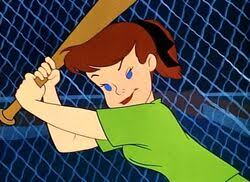 The Caseyettes seem unstoppable, and soon vie for the league championship. Casey, however, is so busy taking bows at the gate, that he finds himself outside the gates as the door closes upon a sold-out crowd. A comic sequence of rapid-fire gags follows as Casey attempts to break-in to his own game. He piles boxes high against the fence, then attempts to climb over – but gets beaned by a home run ball. He digs a hole under the fence – but crosses under a corner of the field, and comes out past the fence bordering the other side of the corner. He digs in again, but the mound of dirt he is encased in is flattened out with a large metal roller by a groundskeeper, squeezing him back outside. Unable to take it any longer, Casey claws apart a section of the fence with his bare hands, and finally gets inside to join his team. The game has already progressed in his absence, and is in the final inning, with a similar situation and need for a clutch hit as in Casey’s final game of old. The Caseyettes’ power-hitter, Mighty Patsy, is advancing to the plate – but is suddenly pulled from the game. Nervous Casey, afraid that the pennant will be lost at this crucial moment, unwisely attempts to break the rules, by appearing himself as a pinch-hitter in dress and red wig. Casey fails to figure his own past ineptness into the equation, and two strikes are quickly recorded, one from his wig falling down over his eyes, the second from his dress slipping down to expose his male trousers underneath. The final pitch sails at him, and once again the air is shattered by the force of Casey’s blow – another swing through thin air, that misses the ball entirely. However, as Casey’s appearance was a violation of rule anyway, Patsy appears directly behind Casey, to legally address the third pitch, pounding it a resounding blow that launches it over the fence. For once, Mudville has reason to smile, and cheer. As a final touch to his last appearance on the playing field, although Patsy legally rounds the bags to achieve the final winning run, Great Casey, a few steps ahead of her, also runs the bases.
The Caseyettes seem unstoppable, and soon vie for the league championship. Casey, however, is so busy taking bows at the gate, that he finds himself outside the gates as the door closes upon a sold-out crowd. A comic sequence of rapid-fire gags follows as Casey attempts to break-in to his own game. He piles boxes high against the fence, then attempts to climb over – but gets beaned by a home run ball. He digs a hole under the fence – but crosses under a corner of the field, and comes out past the fence bordering the other side of the corner. He digs in again, but the mound of dirt he is encased in is flattened out with a large metal roller by a groundskeeper, squeezing him back outside. Unable to take it any longer, Casey claws apart a section of the fence with his bare hands, and finally gets inside to join his team. The game has already progressed in his absence, and is in the final inning, with a similar situation and need for a clutch hit as in Casey’s final game of old. The Caseyettes’ power-hitter, Mighty Patsy, is advancing to the plate – but is suddenly pulled from the game. Nervous Casey, afraid that the pennant will be lost at this crucial moment, unwisely attempts to break the rules, by appearing himself as a pinch-hitter in dress and red wig. Casey fails to figure his own past ineptness into the equation, and two strikes are quickly recorded, one from his wig falling down over his eyes, the second from his dress slipping down to expose his male trousers underneath. The final pitch sails at him, and once again the air is shattered by the force of Casey’s blow – another swing through thin air, that misses the ball entirely. However, as Casey’s appearance was a violation of rule anyway, Patsy appears directly behind Casey, to legally address the third pitch, pounding it a resounding blow that launches it over the fence. For once, Mudville has reason to smile, and cheer. As a final touch to his last appearance on the playing field, although Patsy legally rounds the bags to achieve the final winning run, Great Casey, a few steps ahead of her, also runs the bases.
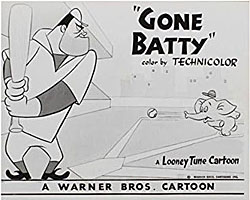 Gone Batty (Warner, 9/4/54 – Robert McKimson, dir.) – A return for Bobo the Elephant from Hobo Bobo, who this time gets to be more involved with baseball than merely being the bat boy. A championship game is scheduled between the Greenville Goons (who bear a surprising resemblance to Friz Freleng’s Gas House Gorillas from “Baseball Bugs”), and the Sweetwater Shnooks, a team that looks absolutely Victorian in style if not age, dressed in tirn-of-the-century uniforms, and most of them with handlebar moustaches. The Goons have a time laughing it up at the appearance of the Shnooks as the line-ups appear on the field, with remarks such as “Hey, grandpa, did you get a banjo with that outfit.” All the polite and reserved Shnooks can reply is “Sticks and stones may break our bones, but names will never hurt us.”
Gone Batty (Warner, 9/4/54 – Robert McKimson, dir.) – A return for Bobo the Elephant from Hobo Bobo, who this time gets to be more involved with baseball than merely being the bat boy. A championship game is scheduled between the Greenville Goons (who bear a surprising resemblance to Friz Freleng’s Gas House Gorillas from “Baseball Bugs”), and the Sweetwater Shnooks, a team that looks absolutely Victorian in style if not age, dressed in tirn-of-the-century uniforms, and most of them with handlebar moustaches. The Goons have a time laughing it up at the appearance of the Shnooks as the line-ups appear on the field, with remarks such as “Hey, grandpa, did you get a banjo with that outfit.” All the polite and reserved Shnooks can reply is “Sticks and stones may break our bones, but names will never hurt us.”
The Shnooks prove about as inept as Freling’s Tea Totallers in battling against the Goons’ cheating. The Goons’ first pitch is a low ball, which tunnels its way to the plate underground. Rather than allow the pitch to be called an obvious ball, the batter pulls out a golf club, and drives the ball deep into right field. Two Goons play teamwork, one pushing a section of the bleachers out into the parking lot, while the other catches the ball where the seats should be for an out. The next batter seems to sock a home run, but is bopped on the head by the catcher with a bat when he touches the plate. “He’s out”, insists the catcher, turning for an opinion from the umpire. “Oh, no he’s not”, the umpire states. The catcher turns back to the runner, and delivers a resounding offscreen blow to him that cracks the bat in two. “Yeesh! NOW he’s out”, admits the umpire.
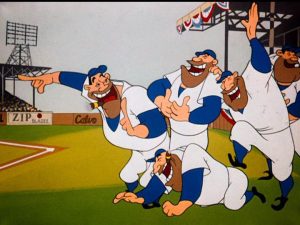 Some backgrounds and animation from Baseball Bugs must still have been available in the studio morgue, as we see reuse of animation of the sportscaster delivering play-by-play, and the same scoreboard as the prior cartoon, now exhibiting what the announcer calls a “deadlocked” score – 167 to nothing in the top of the ninth. A lifted gag from Baseball Bugs appears, with the umpire changing call from strike to ball after the influence of the Goon batter’s bashing of him into a waist-deep hole in the ground. A Goon batter calls his shot: “Watch me clear the bench.” He hits a foul ball directly at the bench of remaining Shnooks players, beaning four of them in one blow, and causing them to keel over. The Shnooks still have their pitcher, but not for long. A pitch is again called a ball. The pitcher approaches the plate to gently protest, “That was a strike. The Goon batter responds by bending elastically the wood of his bat, then letting it go, causing the bat to snap back, and pound the pitcher on the head three times. Before passing out, the pitcher remarks to the Goon in politely underplayed tones, “I don’t like you”.
Some backgrounds and animation from Baseball Bugs must still have been available in the studio morgue, as we see reuse of animation of the sportscaster delivering play-by-play, and the same scoreboard as the prior cartoon, now exhibiting what the announcer calls a “deadlocked” score – 167 to nothing in the top of the ninth. A lifted gag from Baseball Bugs appears, with the umpire changing call from strike to ball after the influence of the Goon batter’s bashing of him into a waist-deep hole in the ground. A Goon batter calls his shot: “Watch me clear the bench.” He hits a foul ball directly at the bench of remaining Shnooks players, beaning four of them in one blow, and causing them to keel over. The Shnooks still have their pitcher, but not for long. A pitch is again called a ball. The pitcher approaches the plate to gently protest, “That was a strike. The Goon batter responds by bending elastically the wood of his bat, then letting it go, causing the bat to snap back, and pound the pitcher on the head three times. Before passing out, the pitcher remarks to the Goon in politely underplayed tones, “I don’t like you”.
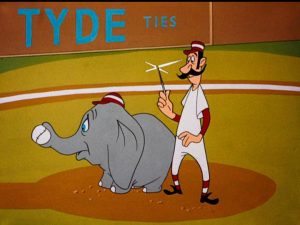 No players left. Time for a forfeit to the Goons. But no! The manager of the Shnooks puts the mascot in to pitch – Bobo the elephant. (I guess the circus sold his lifetime contract.) Bobo is hesitant to pitch, but a jab in his rear from the manager sends a fireball to the plate, burning up the batter’s bat. The batter retrieves a sextet of new bats to choose from, but peels all the wooden bats back like the peel of a banana, revealing a metal bat within. This one won’t burn. However, Bobo’s next pitch has such force, it stops the swing of the bat cold, and sends vibrations right through the batter, causing his entire uniform to be vibrated loose, falling to his feet, and revealing him to the crowd wearing only polka-dot shorts. More material is lifted from “Baseball Bugs”, including an old panning background of home plate and the backstop area, background of the speakers of the public address system, and the old “slow ball” sequence striking out three batters on one pitch.
No players left. Time for a forfeit to the Goons. But no! The manager of the Shnooks puts the mascot in to pitch – Bobo the elephant. (I guess the circus sold his lifetime contract.) Bobo is hesitant to pitch, but a jab in his rear from the manager sends a fireball to the plate, burning up the batter’s bat. The batter retrieves a sextet of new bats to choose from, but peels all the wooden bats back like the peel of a banana, revealing a metal bat within. This one won’t burn. However, Bobo’s next pitch has such force, it stops the swing of the bat cold, and sends vibrations right through the batter, causing his entire uniform to be vibrated loose, falling to his feet, and revealing him to the crowd wearing only polka-dot shorts. More material is lifted from “Baseball Bugs”, including an old panning background of home plate and the backstop area, background of the speakers of the public address system, and the old “slow ball” sequence striking out three batters on one pitch.
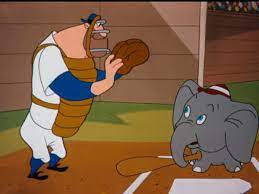 Now Bobo comes to bat, batting for the entire team due to a shortage of players, and using his trunk to hold the bat. Goon pitcher Cannonball Pete lives up to his name, his pitching arm morphing into a cannon barrel at the end of his wind-up. But Bobo delivers a hit. Three outfielders follow the ball like a precision line of dancers in a row, their gloves raised high. But the hit performs the oft-used gag of penetrating a hole right through their mitts and palms. Bobo rounds the bases for a homer, and slides – burrowing into the dirt, and rising from under the plate to register the first Shnooks run. Tine for the Goons to go into “dirty work” mode. The catcher drills a hole in the ball, while the pitcher inserts into the hole a small lighted stick of TNT. The catcher resumes his position behind the plate, and calls for the pitcher to “give it the ol’ pepper”. A fast pitch passes by Bobo, landing the ball squarely in the catcher’s mitt, just as the explosives go off. As the catcher faints, he wearily states that that really was “the ol’ pepper.”
Now Bobo comes to bat, batting for the entire team due to a shortage of players, and using his trunk to hold the bat. Goon pitcher Cannonball Pete lives up to his name, his pitching arm morphing into a cannon barrel at the end of his wind-up. But Bobo delivers a hit. Three outfielders follow the ball like a precision line of dancers in a row, their gloves raised high. But the hit performs the oft-used gag of penetrating a hole right through their mitts and palms. Bobo rounds the bases for a homer, and slides – burrowing into the dirt, and rising from under the plate to register the first Shnooks run. Tine for the Goons to go into “dirty work” mode. The catcher drills a hole in the ball, while the pitcher inserts into the hole a small lighted stick of TNT. The catcher resumes his position behind the plate, and calls for the pitcher to “give it the ol’ pepper”. A fast pitch passes by Bobo, landing the ball squarely in the catcher’s mitt, just as the explosives go off. As the catcher faints, he wearily states that that really was “the ol’ pepper.”
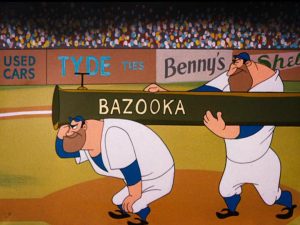 What else can the Goons do under the circumstances? Of course. Two of them position a rapid-fire bazooka upon the mound, and let fly with a seemingly never-ending barrage of baseballs. Bobo’s trunk becomes a blur, refusing to allow a single ball to get past him, batting every one into the field. The entire playing filed becomes littered with baseballs, as the Goons run every which way but can’t seem to catch any for an out. The “Baseball Bugs” “I got it” gag is revisited again, without the gravestone ending, but with the ball merely driving the fielder deep into the ground, with the stadium broadcaster adding the verbal comment, “He got it.” Two more fielders collide together, their faces meshing as if out of a Picasso portrait, as they react in unison, “Which way did he go?” Bobo never seems to be required to run the bases to obtain his scores, and suddenly the scoreboard registers 167 runs, tying the game. “Not bad for a beginner”, remarks the announcer. One more run needed to win. But a last reach into the Goons’ bag of dirty tricks has the catcher tie a rope around Bobo’s hind leg when he isn’t looking. As Bobo gets a hit, the rope trips him up, holding him back from reaching first. Now, why should he have to run the bases this time, seeing as we never saw him run the last 165 runs at all? Nevertheless, Bobo performs the necessary running, circling the bases with the tip of his elongated trunk, and tagging each base for the final winning run. As the game concludes, a talent scout remarks to the Shnooks manager that he has a great baseball find in that elephant. The manager points out an additional advantage for the curtain line: “And he works for peanuts” – which Bobo indeed does, sitting atop a small mountain of same as his reward, chewing for the final iris out.
What else can the Goons do under the circumstances? Of course. Two of them position a rapid-fire bazooka upon the mound, and let fly with a seemingly never-ending barrage of baseballs. Bobo’s trunk becomes a blur, refusing to allow a single ball to get past him, batting every one into the field. The entire playing filed becomes littered with baseballs, as the Goons run every which way but can’t seem to catch any for an out. The “Baseball Bugs” “I got it” gag is revisited again, without the gravestone ending, but with the ball merely driving the fielder deep into the ground, with the stadium broadcaster adding the verbal comment, “He got it.” Two more fielders collide together, their faces meshing as if out of a Picasso portrait, as they react in unison, “Which way did he go?” Bobo never seems to be required to run the bases to obtain his scores, and suddenly the scoreboard registers 167 runs, tying the game. “Not bad for a beginner”, remarks the announcer. One more run needed to win. But a last reach into the Goons’ bag of dirty tricks has the catcher tie a rope around Bobo’s hind leg when he isn’t looking. As Bobo gets a hit, the rope trips him up, holding him back from reaching first. Now, why should he have to run the bases this time, seeing as we never saw him run the last 165 runs at all? Nevertheless, Bobo performs the necessary running, circling the bases with the tip of his elongated trunk, and tagging each base for the final winning run. As the game concludes, a talent scout remarks to the Shnooks manager that he has a great baseball find in that elephant. The manager points out an additional advantage for the curtain line: “And he works for peanuts” – which Bobo indeed does, sitting atop a small mountain of same as his reward, chewing for the final iris out.
• “Gone Batty” is on Vimeo CLICK HERE.
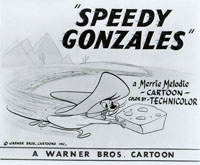 Speedy Gonzales (Warner, Speedy Gonzales, 9/17/55 – I. (Friz) Freleng, dir.) – The Ajax Cheese Factory lies just north of the international border with Mexico. It is seemingly protected by a wire fence at the borderline, though this actually provides no serious obstacle to the neighboring Mexican mice, who can easily slip through the mesh. What really sets the factory apart from those who need its foodstuffs most is the scowling “puss” of Sylvester the cat, who marches on strict sentry duty along the fenceline every day. The mice cower behind rocks as he approaches, then plot their next move. As is their custom, straws will be drawn to see who makes the next attempt for the cheese. A mouse named Manuel “wins” the honor – but emerges from the huddle with eyes glazed, looking like his entire life has just passed before him. A helpful mouse among the crowd offers to hold Manuel’s sombrero while he attempts his mission. With fearful hesitancy, Manual crosses through the fence mesh, then breaks into his best run to head for the factory. The other mice cheer him on in Spanish from their safe vantage point behind the fence. The face of Sylvester is, however, discovered lying in wait for Manuel a short distance away. We do not keep camera on Manuel, but upon the spectator mice – as the music suddenly shifts to a minor key and a somber tone, and a small sound heard offscreen accompanies a downhearted look of shock from the crowd, indicating a pounce which has apparently taken place between the fence and the factory. All is suddenly quiet, and the mouse holding the sombrero looks hopelessly down at the hat, then realizes there will be no further use for it. Hardly looking to see what becomes of it, the mouse tosses the hat away. It drifts over several feet, coming to rest against what is becoming a growing pile of sombreros off to one side – presumably the chapeaus of several of Sylvester’s past victims.
Speedy Gonzales (Warner, Speedy Gonzales, 9/17/55 – I. (Friz) Freleng, dir.) – The Ajax Cheese Factory lies just north of the international border with Mexico. It is seemingly protected by a wire fence at the borderline, though this actually provides no serious obstacle to the neighboring Mexican mice, who can easily slip through the mesh. What really sets the factory apart from those who need its foodstuffs most is the scowling “puss” of Sylvester the cat, who marches on strict sentry duty along the fenceline every day. The mice cower behind rocks as he approaches, then plot their next move. As is their custom, straws will be drawn to see who makes the next attempt for the cheese. A mouse named Manuel “wins” the honor – but emerges from the huddle with eyes glazed, looking like his entire life has just passed before him. A helpful mouse among the crowd offers to hold Manuel’s sombrero while he attempts his mission. With fearful hesitancy, Manual crosses through the fence mesh, then breaks into his best run to head for the factory. The other mice cheer him on in Spanish from their safe vantage point behind the fence. The face of Sylvester is, however, discovered lying in wait for Manuel a short distance away. We do not keep camera on Manuel, but upon the spectator mice – as the music suddenly shifts to a minor key and a somber tone, and a small sound heard offscreen accompanies a downhearted look of shock from the crowd, indicating a pounce which has apparently taken place between the fence and the factory. All is suddenly quiet, and the mouse holding the sombrero looks hopelessly down at the hat, then realizes there will be no further use for it. Hardly looking to see what becomes of it, the mouse tosses the hat away. It drifts over several feet, coming to rest against what is becoming a growing pile of sombreros off to one side – presumably the chapeaus of several of Sylvester’s past victims.
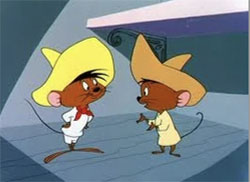 The mice huddle again, deciding that the only one who can get the cheese is Speedy Gonzales, the fastest mouse in all Mexico. How do you get this Speedy Gonzales? One mouse claims Speedy is a friend of his sister. A slow-witted mouse among the group reacts with a slow laugh, that Speedy is a friend of everybody’s sister. But the first mouse insists he can really get Speedy, and heads to a nearby town to inform him of their problem. There, we find Speedy engaged in lucrative employment. At a carnival booth, Speedy acts as living target for the pistolas of patrons, who pay 25 pesos to take 5 shots at Speedy to win a “Beeg” prize. Inside the booth, Speedy nimbly dodges each shot with lightning-fast reactions, taunting the customers to try again. The mouse we saw from the cheese factory appears, whispering to Speedy to have a word with him on the sidelines. The momentary distraction to Speedy almost proves costly as Speedy takes a bullet in his sombrero, but otherwise escapes the target area unscathed. He agrees to help out the mice with their pussy-cat “problemente grosso”, and soon shows up in a cloud of dust at the fence back at the cheese factory. There, the mice have set up a bleacher section to watch the amazing event from seats constructed inside a carton of eggs. Speedy bows to the crowd, and revs up for a launch at the factory, with shouts of encouragement to himself of “Andale” (“hurry up” or “let’s go”) and “Epa” (“Hey” or “Come on”). Sylvester watches from behind a rock, first with curiosity, then with stern determination.
The mice huddle again, deciding that the only one who can get the cheese is Speedy Gonzales, the fastest mouse in all Mexico. How do you get this Speedy Gonzales? One mouse claims Speedy is a friend of his sister. A slow-witted mouse among the group reacts with a slow laugh, that Speedy is a friend of everybody’s sister. But the first mouse insists he can really get Speedy, and heads to a nearby town to inform him of their problem. There, we find Speedy engaged in lucrative employment. At a carnival booth, Speedy acts as living target for the pistolas of patrons, who pay 25 pesos to take 5 shots at Speedy to win a “Beeg” prize. Inside the booth, Speedy nimbly dodges each shot with lightning-fast reactions, taunting the customers to try again. The mouse we saw from the cheese factory appears, whispering to Speedy to have a word with him on the sidelines. The momentary distraction to Speedy almost proves costly as Speedy takes a bullet in his sombrero, but otherwise escapes the target area unscathed. He agrees to help out the mice with their pussy-cat “problemente grosso”, and soon shows up in a cloud of dust at the fence back at the cheese factory. There, the mice have set up a bleacher section to watch the amazing event from seats constructed inside a carton of eggs. Speedy bows to the crowd, and revs up for a launch at the factory, with shouts of encouragement to himself of “Andale” (“hurry up” or “let’s go”) and “Epa” (“Hey” or “Come on”). Sylvester watches from behind a rock, first with curiosity, then with stern determination.
Speedy gives Sylvester a first dose of blinding speed. Sylvester pounces, but misses, Speedy disappears into the factory, then returns to pass Sylvester’s position again, laden with a first small morsel of cheese. Sylvester seems to jump upon him, but the trail of Speedy’s dust emerges from between his legs, and zips back to the other side of the fence, where Speedy tosses the cheese bit to the crowd, then states there is plenty more where that came from. Sylvester meanwhile inspects his own chest, finding Speedy’s passing has mown a line of baldness right down his torso.
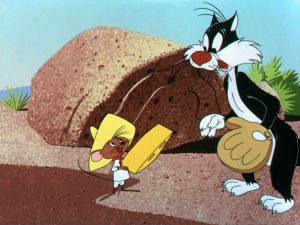 Speedy’s sojourns into the factory continue without substantial interruption, Speedy delivering back to the crowd more and more cheese on each trop. On one run, each of the two antagonists plots a surprise for the other. As Speedy approaches, Sylvester leaps out from behind his rock, wearing a catcher’s mask, and a large catcher’s mitt. He seems to make a solid catch right in his glove, but then looks to see what he caught – finding not a mouse, but a baseball. Disgusted, Sylvester tosses the ball away, which rolls behind him into the factory. The ball actually serves as a miniature “Trojan horse”, as the top half of the ball unscrews, and out jumps Speedy, free to retrieve another load of cheese. Another fun scene has Sylvester block the path between two rocks with a tall wooden board, in which a small hole at the bottom permits only one path of entry past it – a protruding end of a metal pipe, leading to the other side. At the other end of the pipe waits Sylvester, mouth open wide, to swallow anyone who comes through the pipe. Back at the grandstand, Speedy boats to the crowd that this time, he will “do it much faster. Time ne.” He takes Sylvester’s bait, zooming into the metal pipe. However, he emerges with such speed, that he disappears down Sylvester’s throat, then pops a hole in the end of Sylvester’s tail, emerging to make another mad dash into the factory. On his return trip, he attempts to pass Sylvester, but then remembers the wooden barrier blocking the path/ So, he reverses course, goes back in the hole at the end of Sylvester’s tail, emerges out of Sylvester’s mouth, and back through the pipe to safety.
Speedy’s sojourns into the factory continue without substantial interruption, Speedy delivering back to the crowd more and more cheese on each trop. On one run, each of the two antagonists plots a surprise for the other. As Speedy approaches, Sylvester leaps out from behind his rock, wearing a catcher’s mask, and a large catcher’s mitt. He seems to make a solid catch right in his glove, but then looks to see what he caught – finding not a mouse, but a baseball. Disgusted, Sylvester tosses the ball away, which rolls behind him into the factory. The ball actually serves as a miniature “Trojan horse”, as the top half of the ball unscrews, and out jumps Speedy, free to retrieve another load of cheese. Another fun scene has Sylvester block the path between two rocks with a tall wooden board, in which a small hole at the bottom permits only one path of entry past it – a protruding end of a metal pipe, leading to the other side. At the other end of the pipe waits Sylvester, mouth open wide, to swallow anyone who comes through the pipe. Back at the grandstand, Speedy boats to the crowd that this time, he will “do it much faster. Time ne.” He takes Sylvester’s bait, zooming into the metal pipe. However, he emerges with such speed, that he disappears down Sylvester’s throat, then pops a hole in the end of Sylvester’s tail, emerging to make another mad dash into the factory. On his return trip, he attempts to pass Sylvester, but then remembers the wooden barrier blocking the path/ So, he reverses course, goes back in the hole at the end of Sylvester’s tail, emerges out of Sylvester’s mouth, and back through the pipe to safety.
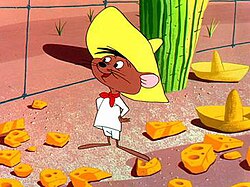 Finally Speedy issues a boast that this time, he will bring back all the cheese. But Sylvester won’t have it. Tired of playing Speedy’s game, Sylvester begins dragging out into the open crate after crate of various varieties of cheese, amassing them all into one all pile. At the base of the pile, he plants explosives, hooked to a plunger detonator. “Just try and get all the cheese”, Sylvester challenges – then, rather than see Speedy victorious, Sylvester is willing to blow the whole supply to Kingdom Come, pushing down the detonator for a terrific explosion. The cheese disappears – at least from his side of the fence. But on the other side, it pours dwn upon the mice in bite-size pieces like so much falling rain. With all lost, Sylvester breaks into a helpless fit of wailing, and begins whacking his own head onto the post of a telephone pole, again and again. Happy and with no further work to accomplish, Speedy remarks to us from his safe side of the fence, “I like that pussy cat fellow. He’s see-lly.”
Finally Speedy issues a boast that this time, he will bring back all the cheese. But Sylvester won’t have it. Tired of playing Speedy’s game, Sylvester begins dragging out into the open crate after crate of various varieties of cheese, amassing them all into one all pile. At the base of the pile, he plants explosives, hooked to a plunger detonator. “Just try and get all the cheese”, Sylvester challenges – then, rather than see Speedy victorious, Sylvester is willing to blow the whole supply to Kingdom Come, pushing down the detonator for a terrific explosion. The cheese disappears – at least from his side of the fence. But on the other side, it pours dwn upon the mice in bite-size pieces like so much falling rain. With all lost, Sylvester breaks into a helpless fit of wailing, and begins whacking his own head onto the post of a telephone pole, again and again. Happy and with no further work to accomplish, Speedy remarks to us from his safe side of the fence, “I like that pussy cat fellow. He’s see-lly.”
Though this was not the first Speedy cartoon, it was the one that established his personality and final design, and his relationship with Sylvester – and thus sped away with an Oscar statuette.
• “Speedy Gonzales” is on Vimeo CLICK HERE.
 Sportickles (Famous/Paramount, Noveltoon, 2/14/58 – Seymour Kneitel, dir.). is a pure clipfest and quota-filler, dipping into the seemingly endless library of visual puns and spot gags from previous Screen Songs and Kartunes (both series having ended their theatrical runs) to supposedly provide a “new” stand-alone six minute cartoon. It’s best to view such films today as a sort of gameplay, to see how many past gags you remember, and play “jigsaw puzzle” to see if you can locate all the old cartoons from which the scenes were culled. Ironically, while Kneitel receives director’s credit though merely contributing a few newsreel-style intertitles as the only new footage of the film, segments within the cartoon include at least some animation directed by I. Sparber, who should have received a credit, considering his last film for the studio was still to come a few months later in the release schedule.
Sportickles (Famous/Paramount, Noveltoon, 2/14/58 – Seymour Kneitel, dir.). is a pure clipfest and quota-filler, dipping into the seemingly endless library of visual puns and spot gags from previous Screen Songs and Kartunes (both series having ended their theatrical runs) to supposedly provide a “new” stand-alone six minute cartoon. It’s best to view such films today as a sort of gameplay, to see how many past gags you remember, and play “jigsaw puzzle” to see if you can locate all the old cartoons from which the scenes were culled. Ironically, while Kneitel receives director’s credit though merely contributing a few newsreel-style intertitles as the only new footage of the film, segments within the cartoon include at least some animation directed by I. Sparber, who should have received a credit, considering his last film for the studio was still to come a few months later in the release schedule.
In this one, of course, the focus is on compiling sports gags (though a few past ones are missed, including the Cleveland Indians gags of old). Baseball is represented by a brief look at an exhibition game, combining footage from two Screen Songs of 1951 – “Drippy Mississippi” (Kneitel), and “Sing Again of Michigan” (Sparber). The only gags are visual puns upon the names of two teams facing each other in the game. The “St. Louis Cards” emerge from the dugout, apparently fresh from a previous exhibition game in Wonderland – a walking series of playing cards, hopefully out of a new deck. Their opponents are the Detroit Tigers – real tigers, who perform their at-bats while enclosed in small steel cages, picking up the whole metal enclosures and extending their legs out the cage bottom when it is time to run the bases.
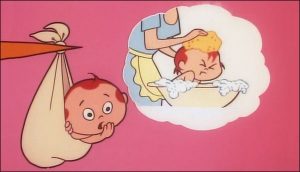 Stork Raving Mad (Famous/Paramount, Noveltoon, 10/3/58 – Seymour Kneitel, dir.) – A stork receives orders from headquarters to make a rush delivery inside of a half an hour. Not a chance, not with the baby he’s been assigned to deliver. The baby awakens while still being carried by the stork’s beak, and is informed he is about to be delivered to his new mama and papa. All the kid can see is visions of aggravating bathtime, being made to take doses of castor oil, and embarrassing smooches from Mama. He wants none of that baby stuff, and decides to see the world and live it up while he still has the chance. As the stork passes through a cloud, the baby gets loose from his beak, and uses the cloth bundle holding him as a parachute to make a gentle landing below. The stork quickly spots him, and insists the rush delivery must go through. The kid cleverly suggests that if they have to rush, why do it the hard way, and hails a taxi. He and the stork get in, but the baby sneaks out the opposite door, and remains standing on the pavements as the car pulls away, waving goodbye to the departing stork.
Stork Raving Mad (Famous/Paramount, Noveltoon, 10/3/58 – Seymour Kneitel, dir.) – A stork receives orders from headquarters to make a rush delivery inside of a half an hour. Not a chance, not with the baby he’s been assigned to deliver. The baby awakens while still being carried by the stork’s beak, and is informed he is about to be delivered to his new mama and papa. All the kid can see is visions of aggravating bathtime, being made to take doses of castor oil, and embarrassing smooches from Mama. He wants none of that baby stuff, and decides to see the world and live it up while he still has the chance. As the stork passes through a cloud, the baby gets loose from his beak, and uses the cloth bundle holding him as a parachute to make a gentle landing below. The stork quickly spots him, and insists the rush delivery must go through. The kid cleverly suggests that if they have to rush, why do it the hard way, and hails a taxi. He and the stork get in, but the baby sneaks out the opposite door, and remains standing on the pavements as the car pulls away, waving goodbye to the departing stork.
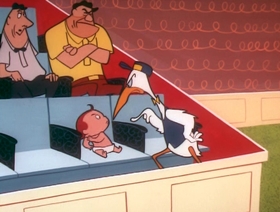 The stork begins a series of pursuits to keep up with the kid. First up, a drug store selling Jumbo Sodas. The kid downs a table of glasses of the stuff, then sticks the stork with the bill for them, leaving him to wash dishes to pay off the debt. Next, a front-row seat at the World Series, where the kid alternates between devouring peanuts, a hot dog, and soda pop. The stork shows up, making a fuss about being late for delivery already. A burly gentleman in the second row takes sides and joins in the kid’s counter-protest. “All right, Mac. Let the kid enjoy himself. SIT DOWN!” Not ready for a fight, the stork plops himself down in a seat in a hurry, forcing a weak grin across his beak. The umpire begins calling three consecutive strikes upon the present batter. The baby doesn’t agree with the calls, and begins booing and calling for the umpire to get a pair of glasses. By the third strike, the stork gets swept up in the sentiment, and begins chanting “Kill the umpire!” Suddenly, the stork is seized by the neck by the burly guy behind him, who informs him, “That umpire happens to be me little brudder.” One sock to the stork’s jaw, and the stork is ejected from the game in a hurry, landing with his beak sticking in the wall of Luney Park amusement park. A wild ride on the Dip of Death roller coaster, and a speedboat ride dragging along the stork on wharf planks as if water skiing, finally results in a crash, throwing stork and baby right to the doorstep of the kid’s new home. Mama is happy at the arrival, but Papa questions, “Where’s the other one? We ordered twins.”. Enough of a shock alone, but the baby adds the topping comment – that his twin brother is “just like me” – enough for the stork to lapse into fits, and leave the scene as if riding on an invisible bicycle, honking his own head like a bicycle horn.
The stork begins a series of pursuits to keep up with the kid. First up, a drug store selling Jumbo Sodas. The kid downs a table of glasses of the stuff, then sticks the stork with the bill for them, leaving him to wash dishes to pay off the debt. Next, a front-row seat at the World Series, where the kid alternates between devouring peanuts, a hot dog, and soda pop. The stork shows up, making a fuss about being late for delivery already. A burly gentleman in the second row takes sides and joins in the kid’s counter-protest. “All right, Mac. Let the kid enjoy himself. SIT DOWN!” Not ready for a fight, the stork plops himself down in a seat in a hurry, forcing a weak grin across his beak. The umpire begins calling three consecutive strikes upon the present batter. The baby doesn’t agree with the calls, and begins booing and calling for the umpire to get a pair of glasses. By the third strike, the stork gets swept up in the sentiment, and begins chanting “Kill the umpire!” Suddenly, the stork is seized by the neck by the burly guy behind him, who informs him, “That umpire happens to be me little brudder.” One sock to the stork’s jaw, and the stork is ejected from the game in a hurry, landing with his beak sticking in the wall of Luney Park amusement park. A wild ride on the Dip of Death roller coaster, and a speedboat ride dragging along the stork on wharf planks as if water skiing, finally results in a crash, throwing stork and baby right to the doorstep of the kid’s new home. Mama is happy at the arrival, but Papa questions, “Where’s the other one? We ordered twins.”. Enough of a shock alone, but the baby adds the topping comment – that his twin brother is “just like me” – enough for the stork to lapse into fits, and leave the scene as if riding on an invisible bicycle, honking his own head like a bicycle horn.
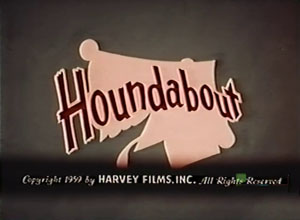 Houndabout (Paramount, Noveltoon, 4/10/59 – Seymour Kneitel, dir.) – A dog (presumably of the terrier variety, given his rather square jaw) named Julius endures a highly uncomfortable night in a leaky doghouse during a rainstorm. The floor of his house is completely flooded, and Julius props himself up with all four paws against the walls of his house, just to keep himself braced above water. However, he is still feeling the moisture, as two sources of leaks drip upon his head from holes in the roof above him. Julius uses his last two appendages to plug both holes with his ears – until a new, larger hole opens directly over his brow, its water flow knocking him off balance and causing him to fall into the tummy-deep water below. Julius has had it, and eyes the comfortable abode of his master, whom he can see through the window making himself a tall sandwich in the kitchen. Julius howls at the front door, and his master relents to let him inside for once on a night like this. The master soon regrets his decision, as Julius shakes water out of his fur, drenching his owner, then attempts to take a bite out of the sandwich on the counter. Julius gets the boot back outside where he belongs. The skies suddenly dry up on cue to save on animation budget, and Julius snaps off his collar, declaring he will no longer lead a dog’s life, and will learn to live like the humans do.
Houndabout (Paramount, Noveltoon, 4/10/59 – Seymour Kneitel, dir.) – A dog (presumably of the terrier variety, given his rather square jaw) named Julius endures a highly uncomfortable night in a leaky doghouse during a rainstorm. The floor of his house is completely flooded, and Julius props himself up with all four paws against the walls of his house, just to keep himself braced above water. However, he is still feeling the moisture, as two sources of leaks drip upon his head from holes in the roof above him. Julius uses his last two appendages to plug both holes with his ears – until a new, larger hole opens directly over his brow, its water flow knocking him off balance and causing him to fall into the tummy-deep water below. Julius has had it, and eyes the comfortable abode of his master, whom he can see through the window making himself a tall sandwich in the kitchen. Julius howls at the front door, and his master relents to let him inside for once on a night like this. The master soon regrets his decision, as Julius shakes water out of his fur, drenching his owner, then attempts to take a bite out of the sandwich on the counter. Julius gets the boot back outside where he belongs. The skies suddenly dry up on cue to save on animation budget, and Julius snaps off his collar, declaring he will no longer lead a dog’s life, and will learn to live like the humans do.
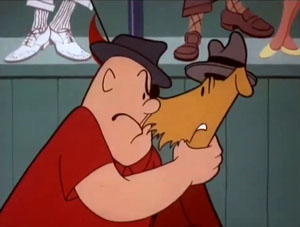 Julius exits the yard and wanders into town as day breaks. He passes a tailor’s shop, where a suit of clothes is displayed on a dummy outside. With no regard for ownership rights, Julius takes advantage of an opportune moment when no one is looking, and steals the entire outfit off the dummy. Now walking on his hind legs in the new suit, Julius admires himself in the reflection of a window, commenting “Clothes sure make the man.” He wanders over to the city park, spotting a sign saying “No Dogs Allowed.” Not so sure whether his new disguise will be effective, Julius cautiously enters the park gate. He is immediately addressed by a cop on the beat, but to his relief, the cop is just exchanging polite greetings, accepting him as human and commenting what a nice day it is for a walk. Now confident, Julius walks with pride.
Julius exits the yard and wanders into town as day breaks. He passes a tailor’s shop, where a suit of clothes is displayed on a dummy outside. With no regard for ownership rights, Julius takes advantage of an opportune moment when no one is looking, and steals the entire outfit off the dummy. Now walking on his hind legs in the new suit, Julius admires himself in the reflection of a window, commenting “Clothes sure make the man.” He wanders over to the city park, spotting a sign saying “No Dogs Allowed.” Not so sure whether his new disguise will be effective, Julius cautiously enters the park gate. He is immediately addressed by a cop on the beat, but to his relief, the cop is just exchanging polite greetings, accepting him as human and commenting what a nice day it is for a walk. Now confident, Julius walks with pride.
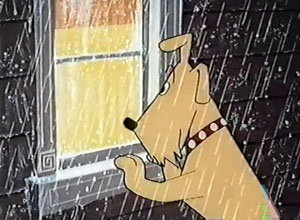 In the course of his adventures, Julius passes the gates of a baseball stadium, where a fly ball lands upon the pavement and rolls out in front of him. Julius brings it to the gate attendant, and asks if they lost it. The attendant permits Julius to enter free for returning the ball, where he attempts to witness his first game. He tries to get into the spirit of things, by repeating everything he hears the other fans say. Unfortunately, he repeats the cheers of persons on both sides of him – one rooting for a team called the Bluebirds, the other for the opposing team of the Dragons. One of them hears him changing allegiances, and seizes him by the collar, demanding to know “Who are you rootin’ for?” To appease the irate fan, Julius states, “The Bluebirds.” But then the man on the other side grabs him, shouting “What’s that?” Julius switches sides again, yelling “The Dragons”. The two men, and others around them, accuse Julius of being a “turncoat”, and a brawl appears imminent. A policeman grabs Julius out of the line of fire, removing him from the bleachers and escorting him to the exit bodily, stating, “What are you trying to do? Start a riot?” Julius is tossed out onto the turnstile.
In the course of his adventures, Julius passes the gates of a baseball stadium, where a fly ball lands upon the pavement and rolls out in front of him. Julius brings it to the gate attendant, and asks if they lost it. The attendant permits Julius to enter free for returning the ball, where he attempts to witness his first game. He tries to get into the spirit of things, by repeating everything he hears the other fans say. Unfortunately, he repeats the cheers of persons on both sides of him – one rooting for a team called the Bluebirds, the other for the opposing team of the Dragons. One of them hears him changing allegiances, and seizes him by the collar, demanding to know “Who are you rootin’ for?” To appease the irate fan, Julius states, “The Bluebirds.” But then the man on the other side grabs him, shouting “What’s that?” Julius switches sides again, yelling “The Dragons”. The two men, and others around them, accuse Julius of being a “turncoat”, and a brawl appears imminent. A policeman grabs Julius out of the line of fire, removing him from the bleachers and escorting him to the exit bodily, stating, “What are you trying to do? Start a riot?” Julius is tossed out onto the turnstile.
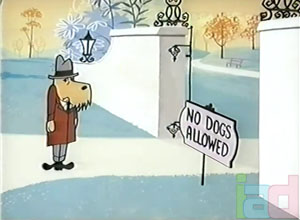 A financial embarrassment occurs when Julius attempts to obtain a meal at a fancy French restaurant – having no idea that money is required to eat, or even what money is. He winds up with a heavy potted plant slammed down over his head. Now realizing the value of money, Julius passes a store which includes an outdoor slot machine. (Gambling laws must be loose in this town.) A single coin is still in the tray at the machine’s base, and Julius thinks it has fallen out accidentally, so replaces it into the machine via the coin slot. Fortune smiles on him, and he hits a jackpot. Now, he hears a whisper from someone beside him, who turns out to be a racing tout. The man recommends running that chicken feed up into some real scratch, by giving him a tip on a horse, and sending him into a local bookie joint. Julius nervously listens to the racing results inside, and his horse comes in – the 100 to 1 shot. Julius exits the racing parlor with his suit bulging with dollar bills, shouting, “I’m rich! I’m rich!” Within a split second, he is at gunpoint from two hold-up men on either side. The two fire as Julius ducks, blasting away the barrels of their respective pistols. The robbers switch to knives, as Julius tries to outrun them around a corner. Seeing no ready means of escape, Julius removes his clothes, pitching the entire outfit and the money over a fence, and nervously sits in canine position on the pavement as the crooks round the corner. They overlook him entirely, and continue on in opposite directions, still looking for their intended human target. Julius races back to his own yard, snaps his collar back on, and lays down inside the doghouse, where he receives his morning bowl of dog food from his master. “There’s nothing like a dog’s life after all”, closes Julius.
A financial embarrassment occurs when Julius attempts to obtain a meal at a fancy French restaurant – having no idea that money is required to eat, or even what money is. He winds up with a heavy potted plant slammed down over his head. Now realizing the value of money, Julius passes a store which includes an outdoor slot machine. (Gambling laws must be loose in this town.) A single coin is still in the tray at the machine’s base, and Julius thinks it has fallen out accidentally, so replaces it into the machine via the coin slot. Fortune smiles on him, and he hits a jackpot. Now, he hears a whisper from someone beside him, who turns out to be a racing tout. The man recommends running that chicken feed up into some real scratch, by giving him a tip on a horse, and sending him into a local bookie joint. Julius nervously listens to the racing results inside, and his horse comes in – the 100 to 1 shot. Julius exits the racing parlor with his suit bulging with dollar bills, shouting, “I’m rich! I’m rich!” Within a split second, he is at gunpoint from two hold-up men on either side. The two fire as Julius ducks, blasting away the barrels of their respective pistols. The robbers switch to knives, as Julius tries to outrun them around a corner. Seeing no ready means of escape, Julius removes his clothes, pitching the entire outfit and the money over a fence, and nervously sits in canine position on the pavement as the crooks round the corner. They overlook him entirely, and continue on in opposite directions, still looking for their intended human target. Julius races back to his own yard, snaps his collar back on, and lays down inside the doghouse, where he receives his morning bowl of dog food from his master. “There’s nothing like a dog’s life after all”, closes Julius.
NEXT WEEK: More last gasps from the theatrical cartoon era – including a delightful special adapted from a successful children’s record.